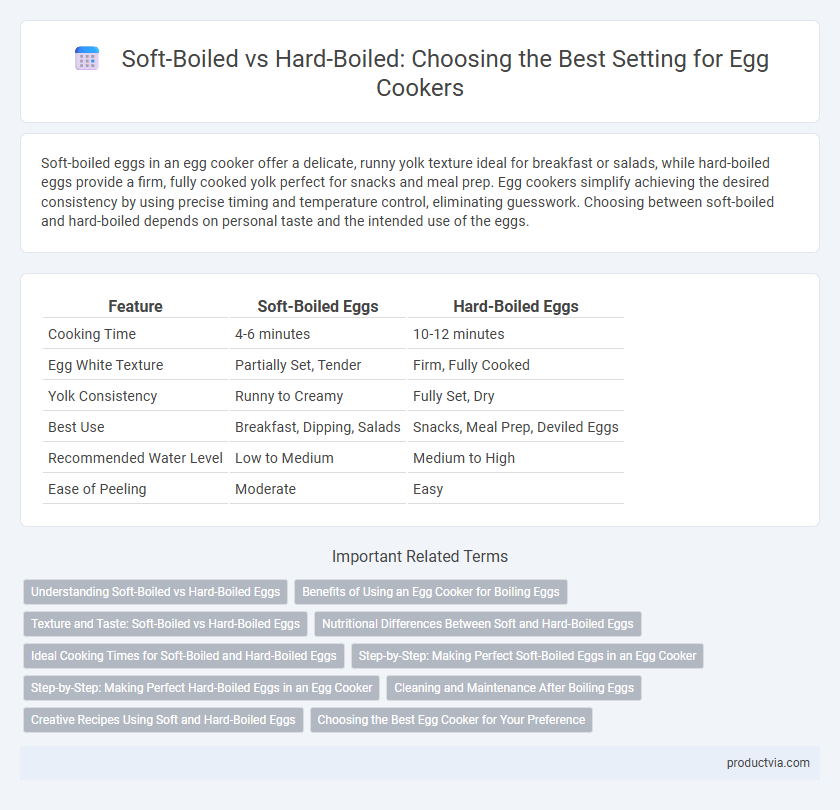Soft-boiled eggs in an egg cooker offer a delicate, runny yolk texture ideal for breakfast or salads, while hard-boiled eggs provide a firm, fully cooked yolk perfect for snacks and meal prep. Egg cookers simplify achieving the desired consistency by using precise timing and temperature control, eliminating guesswork. Choosing between soft-boiled and hard-boiled depends on personal taste and the intended use of the eggs.
Table of Comparison
| Feature | Soft-Boiled Eggs | Hard-Boiled Eggs |
|---|---|---|
| Cooking Time | 4-6 minutes | 10-12 minutes |
| Egg White Texture | Partially Set, Tender | Firm, Fully Cooked |
| Yolk Consistency | Runny to Creamy | Fully Set, Dry |
| Best Use | Breakfast, Dipping, Salads | Snacks, Meal Prep, Deviled Eggs |
| Recommended Water Level | Low to Medium | Medium to High |
| Ease of Peeling | Moderate | Easy |
Understanding Soft-Boiled vs Hard-Boiled Eggs
Soft-boiled eggs have a partially cooked, runny yolk and a tender white, typically requiring 4-6 minutes in an egg cooker. Hard-boiled eggs are cooked thoroughly with a firm yolk and solid white, usually achieved with 9-12 minutes of cooking. Adjusting the egg cooker's timer precisely controls the texture, ensuring optimal softness or firmness based on preference.
Benefits of Using an Egg Cooker for Boiling Eggs
Using an egg cooker ensures precise control over soft-boiled and hard-boiled eggs, delivering consistent texture and perfect doneness every time. The appliance reduces cooking time and minimizes the risk of overcooking or cracking, enhancing convenience and efficiency in the kitchen. Its steam-based cooking method preserves nutrients and flavor, making it a healthier choice compared to traditional boiling techniques.
Texture and Taste: Soft-Boiled vs Hard-Boiled Eggs
Soft-boiled eggs cooked in an egg cooker have a creamy, runny yolk with a tender, slightly firm white, offering a delicate texture and rich, buttery taste. Hard-boiled eggs feature a fully set, crumbly yolk and firm white, resulting in a denser texture and milder flavor. The controlled cooking time and temperature in an egg cooker ensure consistent results tailored to preferred texture and taste.
Nutritional Differences Between Soft and Hard-Boiled Eggs
Soft-boiled eggs retain more moisture, preserving higher levels of water-soluble vitamins such as vitamin B12 and folate, while hard-boiled eggs experience slight nutrient loss due to prolonged heat exposure. Both cooking methods maintain similar protein content, but soft-boiled eggs may have better bioavailability of certain nutrients like lutein and zeaxanthin. The choice between soft and hard-boiled eggs can impact nutrient retention, making soft boils a preferable option for maximizing vitamin intake in an egg cooker.
Ideal Cooking Times for Soft-Boiled and Hard-Boiled Eggs
Soft-boiled eggs typically require 4 to 6 minutes in an egg cooker to achieve a tender white with a runny yolk, while hard-boiled eggs need 9 to 12 minutes for fully set whites and firm yolks. Precise timing ensures optimal texture, preventing overcooking or undercooking. Egg cookers with adjustable timers provide consistent results for both soft-boiled and hard-boiled eggs.
Step-by-Step: Making Perfect Soft-Boiled Eggs in an Egg Cooker
To make perfect soft-boiled eggs in an egg cooker, add the recommended water amount based on the egg quantity, place eggs in the designated trays, and start the cooker for the preset soft-boil setting; the appliance automatically stops when eggs reach the ideal consistency. Typically, soft-boiled eggs take about 6 to 8 minutes, resulting in a runny yolk and tender white, while hard-boiled eggs require 10 to 12 minutes for a fully set yolk. Adjust water levels precisely as per the cooker's manual to ensure consistent, perfectly cooked eggs every time.
Step-by-Step: Making Perfect Hard-Boiled Eggs in an Egg Cooker
Set the egg cooker to the hard-boiled setting and place eggs on the tray, ensuring they are evenly spaced for uniform cooking. Add the specified amount of water according to your egg cooker's manual to generate adequate steam and start the cooking cycle. Once complete, immediately transfer eggs to an ice bath to halt cooking and facilitate easy peeling, resulting in perfectly hard-boiled eggs with firm whites and fully set yolks.
Cleaning and Maintenance After Boiling Eggs
Soft-boiled eggs typically leave less residue in an egg cooker, making cleaning quicker and more straightforward, as their shorter cooking time prevents extensive buildup. Hard-boiled eggs can cause more stubborn residue or calcium deposits inside the cooker, requiring more thorough cleaning with vinegar or descaling solutions to maintain optimal performance. Regular maintenance, including wiping removable trays and checking seals, prolongs the lifespan of the egg cooker regardless of the boiling style used.
Creative Recipes Using Soft and Hard-Boiled Eggs
Soft-boiled eggs with their creamy yolks are ideal for ramen bowls, avocado toasts, and salads, adding a rich texture and depth of flavor. Hard-boiled eggs provide a firm texture perfect for deviled eggs, egg salad sandwiches, and garnishing soups or grain bowls with protein. Using an egg cooker allows precise control over boiling time, ensuring consistent softness or hardness for diverse culinary applications.
Choosing the Best Egg Cooker for Your Preference
Selecting the ideal egg cooker depends on achieving the perfect texture, with soft-boiled eggs requiring precise temperature control to maintain a runny yolk, while hard-boiled eggs demand consistent heat for a fully set center. Egg cookers with adjustable timer settings and separate compartments ensure customizable results tailored to individual preferences. Investing in a model with digital controls and pre-programmed modes simplifies producing consistently soft or hard-boiled eggs every time.
Soft-boiled vs Hard-boiled for egg cooker Infographic

 productvia.com
productvia.com